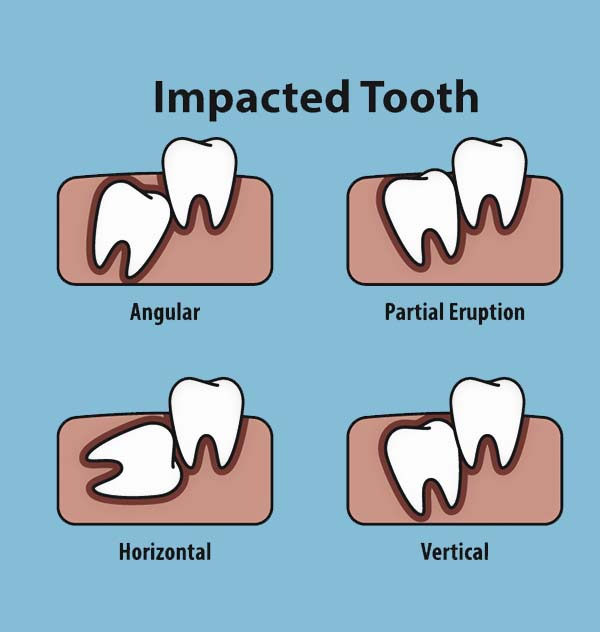Professional Insights on Wisdom Teeth Removal Aspendale for Ideal Recuperation
Professional Insights on Wisdom Teeth Removal Aspendale for Ideal Recuperation
Blog Article
Checking Out Different Sedation Options for a Comfortable Knowledge Teeth Removal Experience
The use of sedation during such treatments has become progressively typical to alleviate anxiety and pain. With an array of sedation options offered, from neighborhood anesthetic to general anesthetic, each method offers varying levels of leisure and pain control.
Neighborhood Anesthesia
Local anesthesia is a frequently made use of method for numbing certain areas of the mouth throughout wisdom teeth extraction procedures. By carrying out a neighborhood anesthetic, such as lidocaine, a dental practitioner can make certain that the client continues to be comfy and pain-free throughout the removal procedure. Regional anesthetic works by temporarily obstructing the nerves in the mouth, avoiding them from sending out discomfort signals to the mind. This enables the dental expert to carry out the removal without causing any type of pain to the client.
One of the main advantages of regional anesthetic is its targeted numbing result, which indicates that just the specific area being treated is affected. This local approach minimizes the risk of systemic negative effects and enables a quicker healing post-procedure. Furthermore, neighborhood anesthetic is thought about to be a safe and routine technique in dentistry, with marginal risks involved when provided by a trained specialist.
Nitrous Oxide
Nitrous oxide, commonly known as laughing gas, is a kind of sedation often used in dental care to assist patients loosen up throughout dental procedures. This sedation alternative permits the person to remain mindful and receptive throughout the treatment while feeling at convenience and comfortable.
As soon as the mask is removed, the impacts of the gas wear off quickly, allowing people to resume their typical activities without remaining sedative results. Nitrous oxide is appropriate for patients of all ages, making it a versatile sedation option for wisdom teeth removals and various other dental procedures.
Dental Sedation
Oral sedation, a pharmacological approach employed in dental care, involves the administration of sedative drugs by mouth to induce an unwinded state throughout oral procedures. This kind of sedation is generally used for individuals undergoing knowledge teeth extraction to ease anxiousness and discomfort. The medications recommended for oral sedation belong to a class of medications called benzodiazepines, which have sedative, anxiolytic, and amnesic residential properties. Typically, the person takes the prescribed medication before the treatment, permitting ample time for the sedative effects to take hold.
Unlike intravenous sedation, oral sedation does not require needles or shots, making it an extra comfortable option for individuals with a worry of needles. Additionally, dental sedation is taken into consideration safe and effective when provided by trained oral professionals.
IV Sedation
Provided intravenously by qualified physician, IV sedation is an effective approach used to induce a regulated state of deep leisure and unconsciousness during dental procedures. Unlike oral sedation, which can be uncertain in its effects, IV sedation allows for exact control over the level of sedation, making it a perfect selection for complicated treatments like knowledge teeth extractions.
During IV sedation, a sedative medicine is supplied directly right into the blood stream via a blood vessel, allowing it to take result swiftly and effectively. This method guarantees that the patient continues to be unaware and comfortable of the procedure while still preserving essential features such as breathing and heart price.
One of the main advantages of IV sedation is its ability to supply a much deeper level of sedation contrasted to various other approaches, making it especially ideal for patients with high degrees of anxiety or those undertaking extensive oral job (wisdom teeth removal aspendale). Additionally, the impacts of IV sedation usually wear away gradually after the treatment, minimizing the probability of grogginess or remaining negative effects. In general, IV sedation offers a reliable and risk-free alternative for making certain a comfortable and hassle-free experience during knowledge teeth extraction

General Anesthesia
Having talked about the advantages of IV sedation for knowledge teeth removal, the use of basic anesthesia gives a different option for patients needing a deeper degree of unfamiliarity throughout dental procedures. General anesthetic induces a regulated state of unconsciousness, making sure the client really feels no pain or pain throughout the removal procedure. This approach is particularly beneficial for people with severe dental stress and anxiety, complicated medical needs, or those going through several removals all at once.
General anesthetic is provided by a skilled anesthesiologist that very closely keeps track of the client's important indicators throughout the treatment. try this web-site It involves the use of intravenous drugs or inhaled gases to generate a state of unconsciousness. While under general anesthetic, the individual will not understand the surgery, experience any kind of pain, or have any kind of recollection of the treatment later.
Although general anesthetic is secure when provided by qualified experts, it carries a slightly higher risk compared to various other sedation choices - wisdom teeth removal aspendale. Patients thinking about basic anesthesia for knowledge teeth removal ought to review the prospective threats and benefits with their dentist or oral doctor to make an informed decision based upon their specific requirements and case history

Final Thought
Finally, numerous sedation options are offered to make certain a comfortable knowledge teeth removal experience. Neighborhood anesthesia is frequently utilized for numbing the details location, while nitrous oxide supplies leisure and pain relief. Oral sedation and IV sedation deal deeper degrees of relaxation, depending on the person's requirements. General anesthesia can be made use of for a lot more intricate situations. It is essential to speak with your dental expert or oral surgeon to figure out one of the most suitable sedation option for your procedure.
Nitrous oxide is appropriate for patients of all ages, making it a flexible sedation choice for wisdom teeth extractions and various other oral procedures.

Report this page